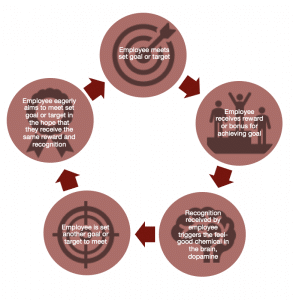Michael Dawson, Managing Director, One4allRewards tells how gamification is used by businesses worldwide to incentivise and reward staff
A key objective for many UK businesses is to motivate their workers, increase employee productivity and reduce staff turnover. It’s a fact that happy workers are more productive. Employees who enjoy their work and are happy within their role will perform better, work harder and remain with a company longer.
A growing trend amongst UK businesses is the use of gamification, which is the use of game mechanics and experience design to digitally engage and motivate people to achieve their goals.
Gamification is not just a new buzzword or gimmick with little meaning, gamification works in real life business situations because it triggers human emotions and as a result, influences certain actions or outcomes. The use of gamification as a rewards and bonus system itself is a psychological tool that taps into an individual’s thought process. Gamification is used by businesses worldwide not only to attract, engage with and retain customers but also by employers to motivate, incentivise and reward staff.
Well-known companies who have adopted the use of gaming with their customers include Starbucks who offers a loyalty card rewards programme, Boots points card and even the Duolingo language app, which rewards users with points and badges for learning new words and passing tests.

Illustration: The compulsion loop in relation to rewards and bonuses
Gartner reports 40% of Global 1000 organisations are using gamification to motivate and encourage positive behaviours.
According to One4allRewards Gamification Report, almost half (48%) of UK businesses have implemented a gamified rewards and bonus system, suggesting that the remaining (52%) are currently missing out on increased productivity by not utilising this method.
In addition to the compulsion loop, there are two other psychological theories that contribute towards the proven success of using gamification in the workplace.
Intrinsic motivation is a key element to implementing a gamified rewards and bonus system, motivation for staff to engage and ‘play’ needs to be built up. The theory of intrinsic motivation is that an individual engages in a behaviour or action, because it is personally satisfying to them without any obvious external rewards.
A simple example of intrinsic motivation would be reading a book, because you enjoy reading or are interested in the subject it covers.
Looking at this in a workplace setting, workers would strive to take the top spot on a team leader board for personal fulfilment.
Reinforcement means to strengthen. The use of reinforcement within psychology is to strengthen or increase the probability of a certain outcome. This is essential when building a gamified rewards and bonus system as positive reinforcement is a key driver behind employee rewards and incentives – by rewarding an individual’s certain action or behaviour with rewards and recognition.
Timing of reinforcement is also crucial when implementing a successful gamified rewards system for employers to know when, what and how many rewards are given to individuals and also setting initial targets for these rewards to be achieved.
An example of reinforcement in the workplace include financial bonuses, praise and time off in lieu. If an employee is expecting a bonus or praise, they will strive to achieve this.
The Gamification report also found that a large majority (79%) of UK workers would like to see gamified rewards introduced into their place of work – highlighting that there most definitely is a demand for a gaming element to be introduced within rewards and bonus systems.
Exploring the influence a gamified rewards system would have in the workplace, the research revealed that this style of rewards and bonus system would increase their happiness at work for 37% of UK workers, while almost the same number (36%) said a gamified incentive package would make them feel more engaged with their company.
A further 38% of the workers surveyed said that working towards a gamified rewards and bonus system would make work more fun.
One4allRewards also investigated the types of rewards currently used by UK businesses and explored the types of rewards UK workers would like to receive.
The study found that the majority (42%) of businesses offering gamified rewards systems are relying heavily on offering fixed action rewards – which award a specific prize for a specific action, such as a named bonus or prize for hitting a set target – but in fact, it is actually surprise rewards which workers say, would motivate them the most.
When questioned on which types of gamified rewards systems would motivate employees the most or for the longest period of time, workers were most likely to cite surprise or unexpected rewards, with virtually 1 in 2 (49%) saying this was the case.
For many businesses specifically those with limited budgets or even those who already have an existing rewards and bonus system in place, the very name and nature of implementing a gamified rewards system can be off-putting. This is especially the case for many SMEs, as they can appear quite complex to implement and clearly communicate amongst a workforce.
Introducing a gamified rewards system is something UK businesses should consider implementing as a gamified rewards system doesn’t necessarily require a complete overhaul of existing rewards and bonuses already in place, it can be as simple as re-working how staff unlock the current rewards and bonus available to them.

